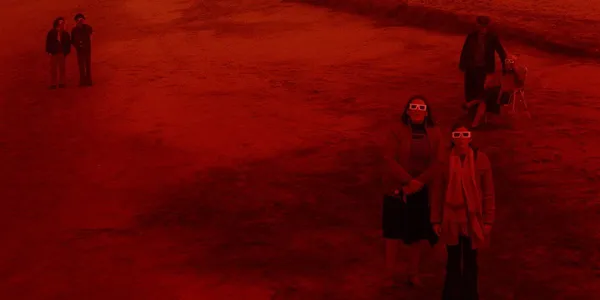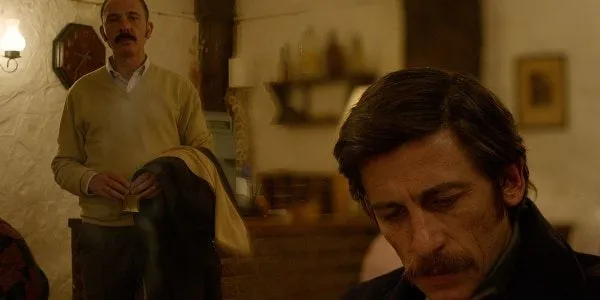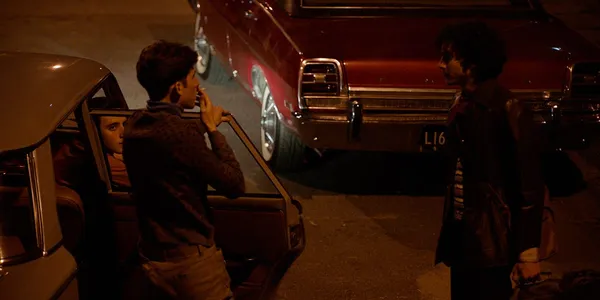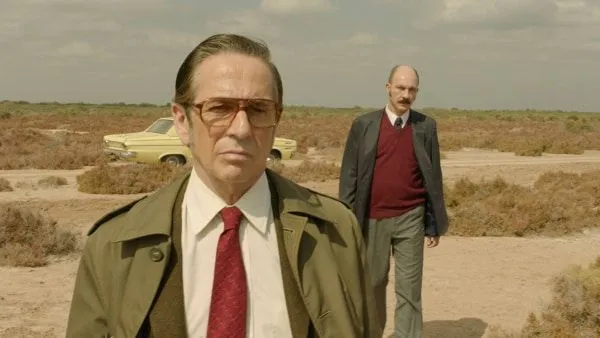Benjamin Naishtat's Rojo - screened in competition at Marrakech Film Festival last week - is set in the Seventies on the cusp of the Argentine dictatorship, which would go on to see 30,000 people disappear. Its political themes are stitched firmly into a darkly comic genre thriller, which sees small town lawyer Claudio (Dario Grandinetti) find himself in a restaurant face-off with an apparently unhinged stranger (Diego Cremonesi) - a situation which later escalates and leads to a night-time trip to the desert. The idea of the middle-classes closing ranks and choosing what to see and what not to see runs deep in the film, as Claudio finds himself under scrutiny from a Columbo-style Chilean detective (Alfredo Castro, having some comedy fun for once) investigating a disappearance.
I love the genre element of the film. You're very consistent in maintaining the Seventies vibe.
Yes, for people who are familiar with those films. Other people will find those choices just odd - but I think it can work in many ways.
I wondered during that period if there were so many Argentine films being made at all?
When I showed the film in Argentina recently there, a lot of people were reminiscing of the American genre films of the Seventies, but people asked me, "What about the Argentine films of the Seventies?" It's a tricky question, for one, because of the political situation in the Seventies it was very difficult to make films at all, and particularly difficult to make good films because a lot of the greatest filmmakers couldn't work at the time. There wasn't an industry that would make a lot of genre movies at the time, they were more into art house, with a lot of influence of the French New Wave and so on. So they weren't so aware of the what was happening with the renovation of the American film scene, which I think is quite interesting.
So you've creating something that never really existed in an Argentinian sense?
It is, so people can be offended by it, as it's sort of an homage to foreign films from the Seventies, but I think that film is a sovereign land itself with no borders. When I think of films, I don't go from country to country.
I'm interested in the way to use small things to mean a lot, such as the idea of flies, which comes up repeatedly in the film.
I guess some people are aware of these things. There's always a degree of randomness to that. For instance, the flies gained a lot of presence in the film because of the last sequence in the desert. That wasn't intended. We arrived there and there was this fly invasion. When something like that happens and you cannot reschedule your shooting because of where you are and the budget reasons and so on, we just decided to go in favour of the conditions we had. So then, while editing, it made sense to connect that with the fly in the beginning and we went a little bit more into focusing on the fly sounds in the beginning and we made a digital little fly which is in the scene where they're having tea in the opening. So, eventually everything connected, but some things are a bit random and just grow up as the shooting unfolds.
It must have been quite difficult for the actors, to ignore the flies. But it speaks to the middle class who are basically ignoring everything in the film. Your film starts with a facade that looks like a normal house and, of course, we learn that the house isn't normal at all.
Also flies suggest something rotten, or even shit for that matter. But I do remember when we were shooting, the Chilean actor ate one of the flies in the middle of the take. It was really funny - he started coughing.
I'm interested in the way you incorporate the younger generation. It's almost like corruption is infectious for them.
There was this idea from the beginning of the script development that we should take on several generations and segments of society. So, you have on one side, you have the fiftysomething, middle-aged generation and you have the young people and their social landscape of the time - where no one is unaware of things. To a certain degree, the young are also involved in a certain behaviour which is changing towards what was a very dark era. It also has to do with the fact that at the time the people disappeared, the average age of them was 23 years old. There were very young people involved in politics and there were people who were very young who disappeared at that time, so you could not leave them out of this portrait.
With the detective character - I assume you were going for a Columbo influence?
Absolutely. I'm a big fan of Columbo and Peter Falk overall. When we were developing the character with Alfredo Castro, the actor, we decided to consciously go for a Columbo performance and even his characterisation and his wardrobe also resemble Columbo's. He's in everyone's imagination, so it was great to go not only for these great films of the Seventies but also for what was a good series, but not good as in the style. There were these series like Columbo and Petrocelli, which were very fun to watch but in terms of filmmaking were not so great. But I thought it was okay to play a little bit within that filmmaking which wasn't so grand or auteur-driven but which was entertainment-driven. To be a little bit among those 'tunes' - not only to go for the Coppola, Peckinpah side of the Seventies but also to go for a more popular, completely down to earth comedy.
It makes it feel more real in a way.
Some people are disappointed by that because there's a changing style, sometimes more sophisticated sometimes not, but I don't know about that. When I'm in an audience, I enjoy watching a film that can be, at times, very accessible and then a little bit more sharp. It should be okay to play both sides.
Was it difficult to cast the film? Did you have them in mind when you were writing it.
Alfredo was in mind at some point during the writing, maybe for the lead, maybe for the detective. Eventually, I asked him to read for the detective and he fell for the character. He thought of it as a challenge and as a funny thing to do and we got along very well. He really wanted to do it, because it wasn't a big budget movie, so he came out of a desire to shoot in Buenos Aires. So it went all right. The lead, Dario Grandinetti, no I didn't have him in mind. but at some point in that period as an option. He has done a lot of films - including Talk To Her, which I love.
It's interesting to see Castro playing the kind of secondary role rather than being the lead.
The greatness of him being a natural lead he brings to his secondary role. It's great when you have very good actors in the secondary role.
The film seems very timely, given the rise of the right again and not just in South America but everywhere. Is that something that you were very conscious of when you were writing the script?
The film development took about five years, so it was a completely different scenario when I started writing the film. Then again, during the process, a lot of things changed in a number of rewrites and in the last ones, we were already entering this current phase of historic acceleration when we see things downgrading. We don't know where this is going to end. When you look at Brazil and Argentina things are very bad right now. So I did consciously change a line or two or certain tones in order to have a more clear connection to the present. Then again, the film has the subject matter that is society through the Seventies and I think that's political enough as a subject.
Has it been released in Argentina?
A month and a half ago. It did well in theatres.
Do you think younger people who go to see the film are going to learn something from it? How much is that period talked about in Argentina?
I had the expectation and one of my motivations was to do a film that could appeal to people who have not had the transmission in their families because of non-politicised families. But the fact is that young people are not going to the cinema so much these days - they just watch Netflix. We did very well in theatres but I went to many screenings that were full of people and it was mostly people in their 40s, 50s and 60s. That's the audiences who are still going to see a drama film today. Young people go only to see superhero movies.
How do you feel about that?
I'm worried, because eventually people are going to die and who is going to go and see a drama or an art house film or a thriller. I'm writing a new project and I have been thinking quite a lot about how to make it really attractive to young people.
Maybe a superhero?
Not a superhero, but I'm thinking certain aesthetics. One interesting case is Spring Breakers, remember that film? I think that'a a great film. I love that film. I think it did very well in the way it's cast and the way the filmmaking captures a way to tell a story for the younger generation. My next project is going to have some awareness of current visual ways of the young.
 |
| Benjamin Naishtat: 'I'm writing a new project and I have been thinking quite a lot about how to make it really attractive to young people' Photo: Courtesy of San Sebastian Film Festival |
Do you think it's going to be more of a modern story?
Actually, it's an adaptation of a 1929 novel but having said that, it will be sent in the present day and I think it's a modern story. It's a novel called The Seven Madmen by an Argentine writer called Roberto Arle. It's a literature classic, a wonderful novel about seven guys who want to conquer the world, seven marginals, actually.
That must be interesting - to go from a project that you're completely developing on your own to a classic that you're adapting. Is it a bit scary?
It is in that people who are aware of the book are going to be judging. Argentinian and Spanish viewers are quite aware of the book and they're going to judge the film by comparing it to the book. But it's a nice challenge - it's nice to have a structure and not to start from scratch.
Has it been adapted before?
It was adapted in the Seventies and it's been made into a TV series a couple of years ago. But, I'm going to take some turns which are going to be really different to what has been done.
Was it something that you've wanted to do for quite a while?
A couple of years now. I think it's time for that book.
Rojo is going to be released in the UK by New Wave and in the US by Distrib Films US next spring.
























